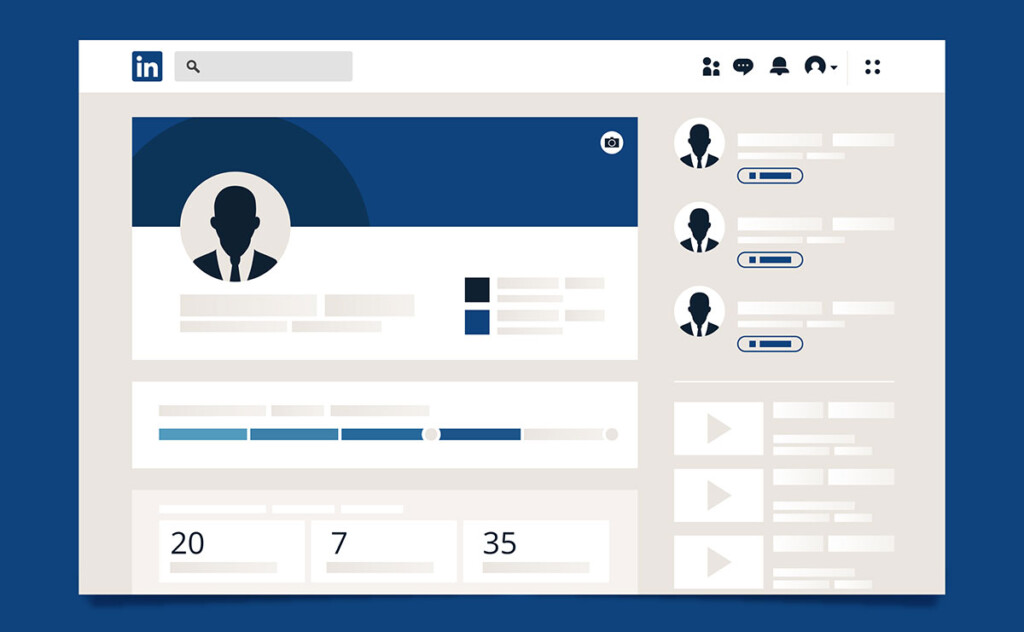How Can Lawyers Boost their Legal Practice with an Optimized LinkedIn Profile?
In today’s digital world, a robust online presence is essential for professionals across all industries, and lawyers are no exception. LinkedIn, the world’s largest professional networking platform, offers an unparalleled opportunity for legal practitioners to enhance their visibility, connect with potential clients, and establish their authority in their field. However, merely having a LinkedIn profile is not enough. To truly stand out and leverage this platform to its fullest potential, lawyers need to optimize their profiles strategically. LinkedIn for lawyers can be a powerful tool for networking, showcasing expertise, and generating new leads through strategic profile optimization, content marketing, and targeted advertising. This article explores how an optimized LinkedIn profile can boost a lawyer’s practice, providing practical tips and insights to help legal professionals maximize their online impact and achieve their career goals.
Why LinkedIn Matters to Lawyers
For lawyers, maintaining an active and well-curated LinkedIn profile is not just an optional extra; it is a crucial tool for career advancement, networking, and business development. Effective LinkedIn marketing for lawyers can lead to increased visibility, stronger professional networks, and more client leads by leveraging strategic content sharing, targeted advertising, and active engagement on the platform. Here are several reasons why LinkedIn matters to lawyers:
Networking Opportunities
LinkedIn provides a vast network of professionals from all over the world. Lawyers can connect with colleagues, former classmates, clients, and other professionals within the legal industry. These connections can lead to referrals, collaborations, and valuable advice.
Professional Branding
A well-maintained LinkedIn profile allows lawyers to showcase their expertise, accomplishments, and professional journey. By regularly posting updates, sharing articles, and engaging with content, lawyers can position themselves as thought leaders in their area of practice.
Client Acquisition
Potential clients often use LinkedIn to research and vet lawyers before making a decision. A strong LinkedIn presence, complete with endorsements and recommendations from clients and peers, can enhance a lawyer’s credibility and attract new business.
Knowledge Sharing and Learning
LinkedIn is a hub for industry news, insights, and trends. Lawyers can follow influencers, join professional groups, and participate in discussions to stay updated on the latest developments in the legal field. Sharing knowledge through posts and articles also helps in building a professional reputation.
Job Opportunities
For lawyers looking to advance their careers, LinkedIn is an excellent resource for job hunting. Legal recruiters and firms frequently use LinkedIn to find potential candidates. An updated profile with detailed experience and skills can attract the attention of recruiters and hiring managers.
Professional Development
LinkedIn Learning offers a plethora of courses on various topics, including those specifically tailored to legal professionals. These courses can help lawyers develop new skills, stay compliant with continuing legal education (CLE) requirements, and enhance their practice.
Engagement with Legal Technology
As legal technology evolves, LinkedIn serves as a platform where lawyers can learn about new tools and innovations that can streamline their work. Engaging with tech companies and reading about the latest trends helps lawyers stay ahead of the curve.
By leveraging LinkedIn, lawyers can enhance their professional network, build their brand, attract clients, stay informed, and explore new career opportunities. In an increasingly connected world, an active and strategic presence on LinkedIn is essential for legal professionals aiming to thrive in their careers.
Effective Ways Lawyers Can Optimize Their LinkedIn Profiles
A well-optimized law firm’s LinkedIn profile can significantly enhance its online presence, attract potential clients, and showcase its expertise and achievements to a broader audience. Here is how lawyers can optimize their LinkedIn profile to boost their legal practice:
Craft a Compelling Headline
Your LinkedIn headline is one of the first things people see. It should be more than just your job title. Incorporate keywords that potential clients or colleagues might use when searching for legal expertise. For example, instead of “Attorney at Law,” use “Experienced Family Law Attorney | Helping Families Navigate Divorce and Custody Issues.”
Use a Professional Profile Photo
A high-quality, professional profile photo builds trust and makes your profile more approachable. Dress in professional attire, use a clean background and ensure your face is clearly visible. A smile can make you appear more friendly and approachable.
Write a Strong Summary
Your summary is your elevator pitch. It should highlight your areas of expertise, your professional achievements, and what sets you apart from other lawyers. Use the first person to make it more personal and engaging. For instance, “As a dedicated criminal defense attorney with over 15 years of experience, I am committed to providing my clients with the highest level of representation and achieving the best possible outcomes.”
Highlight Your Experience and Achievements
Detail your professional experience, focusing on your key responsibilities and achievements in each role. Use bullet points for clarity and include specific cases or projects that demonstrate your expertise and success. If possible, quantify your achievements, such as “Successfully represented over 100 clients in family court, achieving favorable outcomes in 90% of cases.”
Showcase Your Education and Certifications
Include your educational background and any relevant certifications or continuing education courses. This not only adds to your credibility but also helps in networking with alumni and other professionals who have similar qualifications.
Get Recommendations and Endorsements
Recommendations from colleagues, clients, or mentors can significantly enhance your profile’s credibility. Don’t hesitate to ask for endorsements for your skills and recommendations from those you’ve worked closely with. Authentic and specific recommendations can provide powerful social proof of your capabilities.
Share Thought Leadership Content
Regularly posting articles, updates, and insights related to your field can establish you as a thought leader. Share your perspectives on recent legal developments, write about common legal issues, or offer advice. Engaging content not only demonstrates your expertise but also keeps you top of mind with your network.
Engage with Your Network
Active engagement on LinkedIn is crucial. Comment on posts, join relevant groups, and participate in discussions. Networking isn’t just about adding connections; it’s about building relationships and being part of the conversation in your industry.
Optimize for Search
LinkedIn’s search algorithm prioritizes profiles based on relevance and completeness. Use relevant keywords throughout your profile, complete all sections, and regularly update your information. This increases your chances of appearing in search results when someone looks for legal expertise.
Utilize LinkedIn’s Features
Make use of LinkedIn’s features such as LinkedIn Articles to publish long-form content, LinkedIn Live for hosting webinars or live Q&A sessions, and LinkedIn’s job search tools to stay updated on opportunities and industry trends.
Optimizing your LinkedIn profile is a strategic way to enhance your legal practice’s visibility and credibility. By presenting yourself as a knowledgeable and approachable professional, you can attract potential clients, connect with peers, and establish a strong online presence. Remember, your LinkedIn profile is often the first impression you make on potential clients and connections, so make it count.
By leveraging these tips, lawyers can effectively use LinkedIn as a powerful tool to grow their practice, build their network, and stay ahead in the competitive legal landscape.
How to Generate Leads through LinkedIn
Generating leads through LinkedIn can be highly effective for lawyers, and there are several strategies to consider making the most of this professional platform.
Content marketing is a crucial aspect of generating leads on LinkedIn. Share regular updates about recent cases, legal news, and industry developments to stay relevant and visible. Write articles and posts that provide valuable legal insights and advice, establishing yourself as a thought leader in your field. Utilize multimedia content such as videos and infographics to explain complex legal concepts in an engaging and easily digestible manner. Publishing long-form articles on LinkedIn Pulse can further establish your authority and reach a broader audience.
Networking on LinkedIn should be strategic. Connect with potential clients, industry peers, and other professionals who can refer business to you. Join LinkedIn groups related to your area of law, actively participate in discussions, and offer your expert advice. Engaging with the content shared by your connections through likes, comments, and shares can increase your visibility and help build stronger relationships.
LinkedIn advertising can also play a significant role in lead generation. Consider using sponsored content to promote your articles and updates to a wider audience. LinkedIn InMail campaigns allow you to send personalized messages directly to potential leads. Utilize LinkedIn’s targeting options to run ads that reach specific demographics, industries, or job titles, ensuring your content is seen by the right people.
Lead generation forms are another effective tool. Offer valuable content such as eBooks or whitepapers in exchange for contact information, and host webinars or events using LinkedIn’s lead generation forms to collect registrations. This approach not only provides you with leads but also positions you as an authority willing to share knowledge and resources.
Showcasing your expertise is vital. Share anonymized case studies that highlight your successful outcomes, and post testimonials from satisfied clients to build credibility. Display your certifications, awards, and recognitions prominently on your profile to further establish your authority and expertise.
Lastly, regularly monitor your performance using LinkedIn analytics. Track the effectiveness of your posts and ads, and continuously refine your approach based on what works best in attracting and converting leads. By leveraging these strategies, lawyers can effectively generate leads through LinkedIn, building a robust network and showcasing their expertise to a targeted audience.
Conclusion
In conclusion, LinkedIn offers an invaluable platform for lawyers to enhance their professional visibility, connect with potential clients, and establish themselves as authorities in their field. By optimizing their profiles, engaging in strategic content marketing, networking effectively, leveraging LinkedIn’s advertising and lead generation tools, and showcasing their expertise, legal professionals can significantly boost their online presence and achieve their career goals. Regular monitoring and refining of these strategies will ensure that lawyers can continue to attract and convert leads, build a robust network, and stay ahead in the competitive legal landscape. Mastering LinkedIn for lawyers involves not only creating a professional profile but also actively engaging with content, networking strategically, and utilizing advanced features to generate leads and build a strong online presence.

